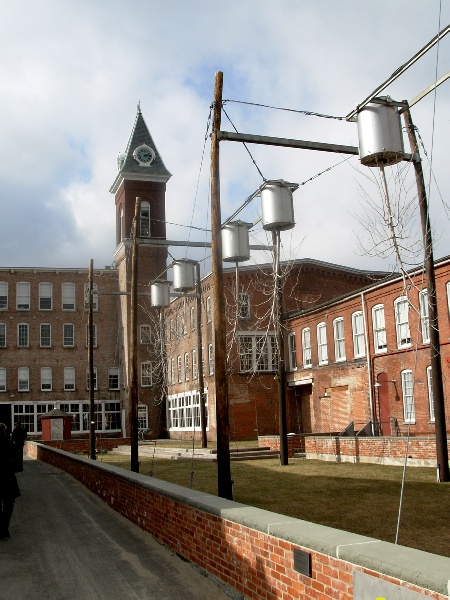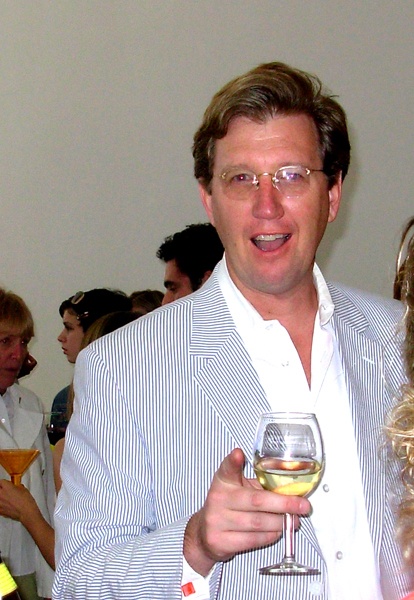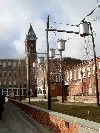Mass MoCA Starts Cleaning Up the Buchel Mess
Making Way for the Jenny Holzer Installation To Open on November 17
By: Charles Giuliano - Sep 25, 2007
After almost a year of being hogtied by the Swiss installation artist, Christoph Buchel, hard on the heels of a court decision by Federal Judge Michael A. Ponsor, last Friday, the museum has decided not to open a display of the unfinished work as was originally speculated as recently as this past weekend. As anticipated, yesterday the artist filed an appeal. But in a surprise move today MASS MoCA decided to just trash the artist and his project. Short of an injunction the museum is working as rapidly as possible to clear its largest exhibition space and move on with programming.
While Buchel is appealing the decision that seems to be a moot point if the museum succeeds in its intention to remove the material that never reached the point of being a completed project after months of labor, entirely on the part of the museum and its staff, and some $300,000 or twice the initial budget projection.
One concern in the past year has been the lack of any critical dialogue about the project gone so terribly wrong and its serious impact on the cultural, business, and academic community which surrounds the museum in Northern Berkshire County. Apparently that issue will be addressed in a symposium planned shortly that will be co presented by the museum and its neighbor, a soon to be business partner, the Clark Art Institute.
In reporting on the Buchel court decisions we commented that while the legal matter has been ruled on that the "jury is still out in the court of public opinion." Since then the majority of those we discussed the matter with in the art world have favored the museum rather than the artist. It is widely agreed that the museum and its director, Joe Thompson, blundered badly by not anticipating the petulant reputation of the artist, its inept contract, and other pratfalls. But, oddly, the strident tone of Roberta Smith in the New York Times has been widely viewed as so shrill and one dimensional that it had the odd impact of generating support for the museum. It is widely viewed that the artist was willing to allow the museum to labor and pay for the work and that this collaboration comes with an obligation to deliver an exhibition. Particularly when a relatively small amount of money was involved compared to the multiple millions that artists such as Christo pour into their projects. If Buchel really wanted that burned out commercial airplane then he should have gone out and gotten it. Or, as Roberta Smith would say, "End of story."
What follows below is the full release from Mass MoCA filed today.
(North Adams, Mass. – Tuesday, September 25, 2007) MASS MoCA announced today that it has begun removing materials gathered for Training Ground for Democracy and will not permit the public to enter the planned installation which was cancelled on May 21, 2007. Materials and partially completed fabrications for this large-scale installation have been stored in MASS MoCA's main Building 5 gallery since the artist abandoned the project nine months ago. The front doors to the gallery have been locked, and the materials covered by tarpaulins.
Ever since the artist left MASS MoCA in December 2006, the museum explored every possible avenue in an effort to re-engage the artist, and when those efforts proved futile, the museum offered him the opportunity to retrieve the materials from the museum galleries (reimbursing the museum for its costs), which he declined to do. In late May 2007, MASS MoCA sought a declaratory ruling in the U.S. District Court, Springfield, Massachusetts, to rule on its and the artist's rights in regards to the unfinished work. Even after bringing suit, however, MASS MoCA sought on numerous occasions to reach a mutually acceptable resolution of the dispute. None of those efforts were successful.
"With several hundred tons of materials and thousands of objects and partial constructions sitting abandoned in our galleries, we carefully considered what we could do," said Joseph C. Thompson, MASS MoCA's director. "We obviously cared a great deal for the work and had expended extraordinary effort and energies to try to bring it into existence; we did not want to act precipitously in either dismantling or displaying it. With no other options, and wanting to move forward as the situation continued to draw resources away from other artists and public programming, we sought a declaration of our respective rights by an impartial party – a federal judge."
Judge Michael A. Ponsor of the U.S. District Court Second Circuit ruled on Friday, September 21, that MASS MoCA could exercise its curatorial discretion with respect to the materials, including making the assembled materials available for viewing when accompanied by signage explaining that it was an unfinished work.
"We are deeply appreciative of the Court's thoughtful scrutiny of this matter. After giving careful deliberation to the interests of many constituents, including the artist's own views, and factoring in the limited time window available given our normal exhibition cycle -- together with other considerations both logistical and philosophical-- we have decided to begin removing the materials immediately without placing them on public display. We are eager to return to our core mission to serve as a experimental platform for art-making, and we look forward to commencing work immediately on the previously announced installation by Jenny Holzer, Projections, which will open November 17, 2007.
The museum announced today that in conjunction with The Clark Art Institute, it would co-host a symposium devoted to the issues raised by this case. The symposium will be held later this fall.
With a track record spanning eleven years and including the fabrication of more than 70 new visual arts works, MASS MoCA has a history of creating milestone collaborations with some of the world's leading living artists. Coupled with the more than 40 works of performing arts created, rehearsed, or technically enhanced through residency programs, MASS MoCA is one of the nation's most fertile sites for nurturing and supporting new art in all media. As part of its mission to reveal to its audience the entire spectrum of the art-making process, and to introduce artists to new audiences, in new contexts, MASS MoCA routinely opens its galleries during installation and fabrication, and presents numerous open rehearsals, workshop presentations, and work-in-progress showings.
MASS MoCA, the largest center for contemporary visual and performing arts in the United States, is located off Marshall Street in North Adams, Massachusetts, on a 13-acre campus of renovated 19th-century factory buildings. MASS MoCA juxtaposes a beautifully restored icon of the American industrial past with some of the liveliest, most evocative—and provocative—art being made today. Emphasizing art that charts new territory, art that ignores traditional boundaries between the performing and visual arts, and installations that are immersive in scale, MASS MoCA has received some of the nation's most coveted architectural and historic preservation honors. MASS MoCA presents an unusually varied program, including rollicking dance parties and "silent film/live music" series, and has made a significant contribution to the cultural landscape of New England and the United States, and the socioeconomic landscape of its home community.



